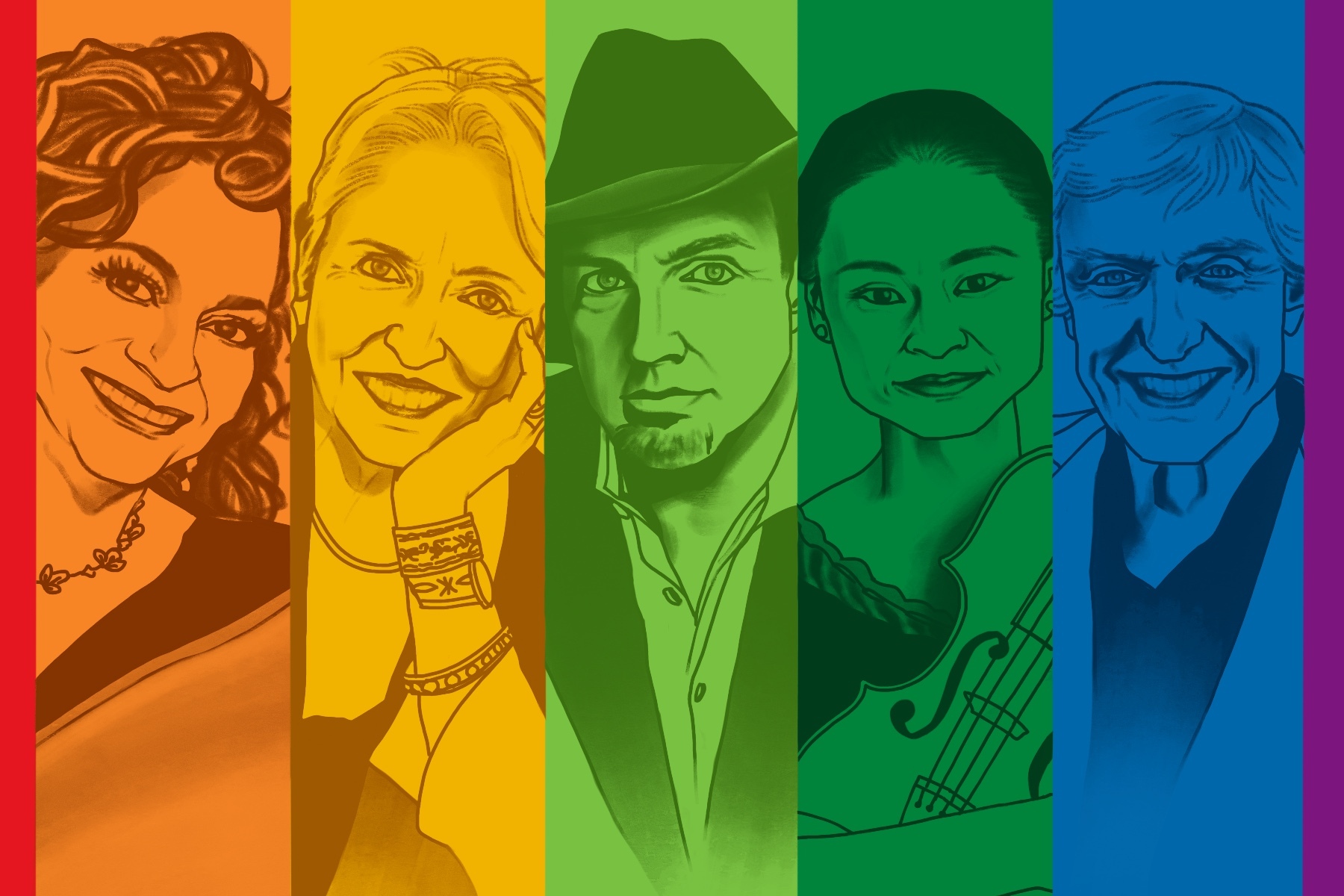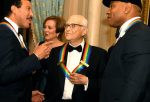The annual entertainment industry award season was recently extended by the broadcasting of the highly acclaimed Kennedy Center Honors, presented on June 6 in a notably different format. The Honors recognize performing artists who have made groundbreaking contributions to their respective fields and have become iconic figures in popular culture.
A revered event now in its 43rd year, the night has become associated with moving performances and informational presentations about the celebrated individuals. There is typically no association among the selected artists, who work across the spectrum of the arts. Compared to its peers, the Kennedy Center selects a small group of individuals, with this year’s pool comprising five artists. Those honored were longtime actor Dick Van Dyke, prodigious violinist Midori, activist and folk singer Joan Baez, actress and choreographer Debbie Allen and record-shattering country singer Garth Brooks.
Despite being a mainstay of annual award shows, the Kennedy Center Honors are precariously dependent upon significant funding, which not only covers the costs of the night but goes toward the Center’s continued operation as the national curator of the performing arts. As with many other fundraising campaigns, the conditions of the pandemic have reduced the ability of patrons to donate, and this year’s Honors brought in a more modest total when compared to other years.
The event has always sought to generate enthusiasm for the arts, but its celebratory reverence of creativity is especially pertinent given the unfortunate consequences of the pandemic. Arts programs in schools around the country have been adversely affected by budget cuts, making the importance of preserving the public’s faith in creative expression greater than ever.
As an institution originally brought to fruition by Congress, the role of the federal government in contributing to the Kennedy Center’s visibility and scope has always been critical. Joe Biden revived the tradition of inviting the honorees to the White House, a courtesy that symbolically demonstrates the commanding influence the Center has had on popular culture. The Honors that occurred during the Trump administration lacked a presidential presence as Trump avoided each ceremony after several artists refused to attend the White House gathering in 2017.
Biden, by meeting with this year’s honorees, is reiterating the necessity of appreciating artists’ contributions to the nation’s cultural footprint. The president has always been responsible for directing the course of the Kennedy Center, appointing trustees and forming a committee to offer guidance on the Center’s actions. There is reason to believe that greater initiative from President Biden on ceremonial matters indicates that the consequential functions of the Kennedy Center will be treated with greater respect in the coming years.
The greatest tonal shift of this year’s honors was a movement away from conventional, single-stage performances and speeches. The tired format of a host speaking in between stage acts contributes to the perception that award shows are a dime a dozen, and the Kennedy Center demonstrated a concerted effort to separate itself from its peers in this regard.
The old format can appear contrived and disingenuous, an attempt to cram an overwhelming amount of content into a limited timeframe. The Kennedy Center Honors event feels more appreciative and celebratory precisely because it homes in on each honoree and focuses on their singular contributions and talents.
Each profile includes interview footage of the artist it covers, allowing for an interaction between traditional third-person documentation and the honoree’s own interpretation of his or her work. Listening to Debbie Allen speak about her desire to inspire today’s youth to pursue artistic ventures exemplifies the Kennedy Center Honors’ commitment to offering immersive glimpses into the minds of America’s greatest cultural figures.
One of the tributes to Joan Baez perfectly encapsulates the warm environment cultivated by this year’s show. Songwriter Aoife O’Donovan shared a clip of her rendition of Baez’s “Love Song to a Stranger” on the Kennedy Center website, which has assembled a digital catalog of media associated with the Honors. The cover of the song was preceded by a few words of appreciation for Baez’s direct contributions to folk culture and indirect influence on O’Donovan’s own musical journey.
The video is intimate, spontaneous and feels immensely more genuine than a standard speech overflowing with flowery cliches. Activism has always remained a core value for Baez, who played a crucial role in aligning folk music with human rights movements throughout her life.
It is impossible to segregate her political beliefs from her songwriting, and the portion of the ceremony dedicated to her work accurately focuses on how the intersection of the two is responsible for her enduring legacy. Baez’s segment was characteristic of all the profiles and tributes, which were more than mere laundry lists of accolades. All parts of the broadcast were thorough storytelling experiences that revealed how individual artistry can inspire others.
The Honors have always relied on guest artists to perform the honorees’ acts, further demonstrating the extent of their influence on the world of the performing arts. The productions woven into this year’s ceremony ranged from a performance of Van Dyke’s “Put on a Happy Face” to a dance number set to the theme from “Fame,” with each one seeking to breathe new life into long-heralded examples of the honorees’ works.
Each piece is framed to demonstrate the lasting inspiration the honorees have offered for successive generations. Many of the artists included in the presentation of the event are artistic titans, often with significant experiential overlap with the newly inducted class. Yo-Yo Ma’s performance during Midori’s tribute demonstrates that while the five honorees can attribute their success to the general public’s investment in their talents, they are most intensely revered by their peers.
The artists honored at the Kennedy Center are individuals who have received high praise their entire adult lives, and perhaps the greatest product of the night is the rare opportunity for public introspection. Midori spoke on the particular significance of this post-pandemic Honors ceremony, affirming that “being able to see the arts coming back into our lives again” brought great personal gratification.
The Kennedy Center Honors are a night to contemplate past achievement, but Midori sees her selection as an opportunity to look toward her forthcoming ambitions. “My plans are to be making music again,” she explained, “in both pioneering and traditional ways, to sing out and to stir what lies within us, to describe mysteries, of the heart and of the mind.” A musician with an extensive history of adapting classical music for contemporary audiences, Midori’s sentiments herald the continuation of her ongoing journey as a violinist.
Although he is the best-selling American solo album musician, Brooks emphasized his humility in a post-show interview. He emphasized that “…what [he] saw, for the difference between performing and being there, was the time they allowed the five honorees with each other. You walk out of here going ‘Damn…I could quite possibly be the weak link in this chain, and I am fine with that!’” Brooks’ sentiments echo the tone of the night and underscore the five artists’ mutual admiration of one another and immersion in the collective greatness of the group.
Van Dyke offered a much simpler commentary that perfectly encapsulates the overwhelming joy of the Honors: “How I got here I don’t know, and I’m not going to ask.”














